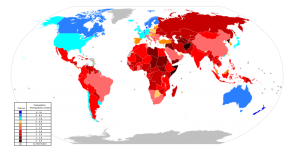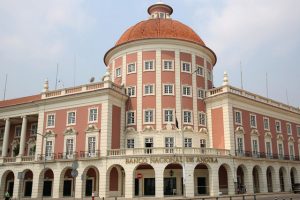Corruption in Angola is a pervasive phenomenon that impedes and disrupts economic growth and government-sponsored liberalization programs in the country.

The Soviet press, despite the close relationship between Angola and the Soviet Union, accused the MPLA of corruption, clientelism and nepotism, accusing the government of illegally accumulating 1 billion dollars. The Russian magazine Ogonyok writes that “corruption has flourished on a scale that is unprecedented, even in Africa … the party in power in Angola … being pro-communist, by nature, was ready to sacrifice everything and everyone.”
1990s
In April 1999 Gustavo Costa, a journalist for Expresso, wrote an article entitled Corruption makes victims, accusing José Leitão, the main presidential adviser, of embezzling government revenues. Angolan police arrested Costa and accused him of defamation and injury. The Angolan Supreme Court found him guilty, sentencing him to eight months in prison, suspended for two years, and fined $ 2,000. Rafael Marques de Morais, journalist and human rights activist, wrote O Batom da Ditadura, an article criticizing corruption in the Angolan government and President José Eduardo dos Santos, on July 3.
The National Criminal Investigation Division (DNIC) questioned him on October 13 for several hours before releasing him. Later that day Morais gave an interview to Rádio Ecclesia and repeated his criticism of the Santos government. Twenty armed members of the Rapid Intervention Police then arrested him along with Aguiar dos Santos, editor of the newspaper Ágora, and José Antonio Freitas, reporter for Agora, on charges of defamation, on October 16, 1999. Marques said that dos Santos he was responsible for the “destruction of the country… for the promotion of embezzlement, incompetence and corruption as political and social values.”
In May 1999, the World Bank threatened to cut aid to Angola if the government did not take serious measures to combat corruption, starting with an audit of the oil and diamond industries, Angola’s main sources of income.
2000’s
Under the government of José Eduardo dos Santos, high levels of corruption remained, with the media and financial institutions controlled by elements close to the president. Nowadays Angola is in the list of the most corrupt countries in the world and with the lowest human development index, this in a country with one of the highest economic growth in the world.
Due to the effects of the international financial crisis and the temporary drop in oil prices, Angola was forced, in 2008, to ask for help from the IMF and to submit to the demands imposed by this institution. These include severe measures against corruption and a lack of budget transparency. These requirements have been partially met, eg with respect to the relationship between the State and Sonangol. However, the global situation in relation to corruption has not improved, as shown by Angola’s position in Transparency International’s annual indexes: while Angola was ranked 147 in 2006 (1 being the best), which is already extremely problematic, the country has since descended step by step, reaching 168 in 2010 in 178 countries, thus being part of the ten most corrupt countries in the world.
Largest financial fraud in Angola
The National Bank of Angola was the victim of a $ 160 million fraud, when it was discovered that the Angolan treasury account at Banco Espírito Santo in London, that several money transfers went to bank accounts controlled by the suspects. When the BNA account reached minimum values, it was BES from London itself that alerted the Angolan authorities to the successive outflows of money.

The investigation of the diversion of funds from the National Bank of Angola (BNA) has been going on for over a year in Portugal and Angola. As part of the investigation of this process, 25 people have already been detained in Angola, some of whom are employees of the Ministry of Finance and BNA. Large amounts of money have already been recovered between time.
According to Human Rights Watch and the Angolan government, large diversions of money outside Angola were carried out by a former governor of the BNA. Aguinaldo Jaime, tried to carry out a series of suspicious transactions of 50 million dollars with several foreign banks, namely European and American banks. It was the banks in question that refused the money and stopped the operation.



